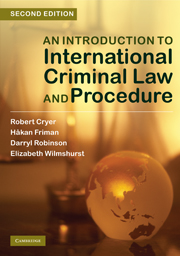Book contents
- Frontmatter
- Contents
- Preface to the Second Edition
- Table of Cases
- Table of Treaties and other International Instruments
- Table of Abbreviations
- PART A INTRODUCTION
- PART B PROSECUTIONS IN NATIONAL COURTS
- 3 Jurisdiction
- 4 National Prosecutions of International Crimes
- 5 State Cooperation with Respect to National Proceedings
- PART C INTERNATIONAL PROSECUTIONS
- PART D SUBSTANTIVE LAW OF INTERNATIONAL CRIMES
- PART E PRINCIPLES AND PROCEDURES OF INTERNATIONAL PROSECUTIONS
- PART F RELATIONSHIP BETWEEN NATIONAL AND INTERNATIONAL SYSTEMS
- Index
- References
3 - Jurisdiction
from PART B - PROSECUTIONS IN NATIONAL COURTS
Published online by Cambridge University Press: 05 June 2012
- Frontmatter
- Contents
- Preface to the Second Edition
- Table of Cases
- Table of Treaties and other International Instruments
- Table of Abbreviations
- PART A INTRODUCTION
- PART B PROSECUTIONS IN NATIONAL COURTS
- 3 Jurisdiction
- 4 National Prosecutions of International Crimes
- 5 State Cooperation with Respect to National Proceedings
- PART C INTERNATIONAL PROSECUTIONS
- PART D SUBSTANTIVE LAW OF INTERNATIONAL CRIMES
- PART E PRINCIPLES AND PROCEDURES OF INTERNATIONAL PROSECUTIONS
- PART F RELATIONSHIP BETWEEN NATIONAL AND INTERNATIONAL SYSTEMS
- Index
- References
Summary
Introduction
Jurisdiction is the power of the State to regulate affairs pursuant to its laws. Exercising jurisdiction involves asserting a form of sovereignty. This fact causes difficulties when jurisdiction is exercised extraterritorially. Where extraterritorial jurisdiction is asserted sovereignties overlap, and general international law has not yet developed any principles to determine any hierarchy of lawful jurisdictional claims. This chapter discusses the principles of jurisdiction as they relate to international crimes. In some instances the extent to which international law allows jurisdiction over international crimes is broader than the jurisdiction which it offers over other crimes. Therefore this chapter must be read with the caveat that it is not a general discussion of the law of jurisdiction, but an explanation of jurisdiction over international crimes, a topic which is not coterminous with the general international law of jurisdiction, although it forms part of it.
The forms of jurisdiction
There are three ways in which jurisdiction may be asserted: legislative, adjudicative and executive. The extraterritorial assertion of legislative jurisdiction is less controversial than that of adjudicative jurisdiction, and, in the absence of consent, claims of extraterritorial executive jurisdiction almost inevitably infringe the sovereignty of the relevant territorial State.
Legislative jurisdiction
This is the right of a State to pass laws that have a bearing on conduct. Some States take the view domestically that they are entitled to pass legislation covering matters which take place throughout the globe: hence the aphorism that the UK Parliament could pass a statute making it a crime for a French person to smoke on the streets of Paris.
- Type
- Chapter
- Information
- Publisher: Cambridge University PressPrint publication year: 2010



